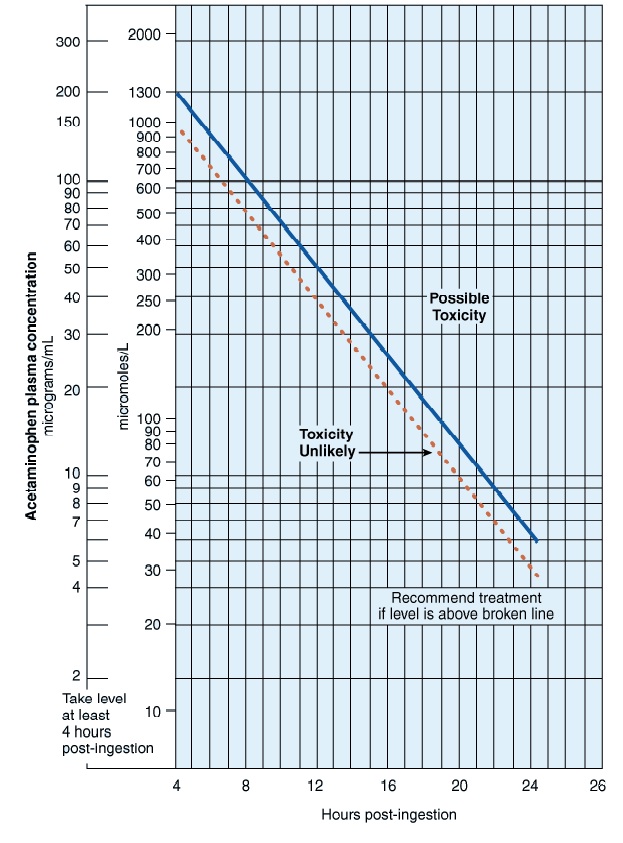Acetaminophen toxicity
Background
- Recommended maximum total daily dose:
- Adults: 3gm
- Peds: 75mg/kg
- Toxic dose
- >10gm or >200mg/kg as single ingestion or over 24hr period OR
- >6gm or >150mg/kg per 24hr period x2d
- Peak serum levels seen within 2hr
The 140 Rule
- Toxic dose is 140 mg/kg
- Give NAC if level is >140 mcg/mL four hours post-ingestion
- Initial loading dose of NAC is 140 mg/kg PO
Pathophysiology
- APAP toxic metabolite NAPQI usually quickly detoxified by glutathione
- In overdose, glutathione runs out, NAPQI accumulates -> liver injury
- NAC increases availability of glutathione
Clinical Features
- Stage 1 (first 24hr)
- Mild N/V/malaise
- Hypokalemia (a/w high 4-hr level)
- Stage 2 (days 2-3)
- Improvement in symptoms
- RUQ abd pain
- Elevated transaminases
- Elevated bilirubin, PT (if severe)
- Stage 3 (days 3-4)
- Recurrence of N/V
- Hepatic failure
- Jaundice
- Coagulopathy
- Encephalopathy (esp w/ massive ingestions)
- Renal failure (1-2%; usually after hepatic failure is evident)
- Pancreatitis (rare)
- Stage 4 (after day 5)
- Clinical improvement and recovery (7-8d) OR
- Deterioration to multi-organ failure and death OR
- Continued deterioration
Diagnosis
- APAP level
- Obtain 4hrs post-ingestion
- Obtaining multiple levels is rarely indicated in the absence of hepatotoxicity
- Nomogram (see below)
- Only indicated for single, acute ingestion occurring <24hr prior to presentation
Work-Up
- APAP level
- Chemistry
- Metabolic acidos seen w/ extremely large ingestion
- LFT
- PT/PTT/INR
- Acetaminophen level: 4 hours post ingestion and repeat in 4 hours
N-acetylcysteine
- Background
- Almost 100% effective if given <8 hr post-ingestion; less effective if 16-24 hr post-ingestion
- May still be useful >24 hr post-ingestion, even with fulminant hepatic failure
- In pts who develop hepatic injury, give NAC until LFTs improve (not until APAP level is 0)
- Almost 100% effective if given <8 hr post-ingestion; less effective if 16-24 hr post-ingestion
- Dosing
- PO:
- 140mg/kg PO load
- 70mg/kg PO q4hr x17 doses additional; dilute to 5% soln
- IV
- Loading dose: 150mg/kg in 200 mL D5W over 60min
- Second (maintenance) dose: 50mg/kg in 500 mL D5W over 4hr
- Third dose: 100mg/kg in 1000 mL D5W over 16hr
- PO:
- Side-effect
- PO: N/V due to sulfur-smell (may require concomitant anti-emetic)
- IV: anaphylactoid reaction
Management
<4hr after ingestion
- GI decontamination
- Activated Charcoal if <3 hr post-ingestion
- Gastric Lavage if high-morbidity coingestants and <1 hr post-ingestion
- Send 4hr APAP level
- Toxic level: Give NAC
- Nontoxic level: No treatment necessary
Between 4-24hr after ingestion
- Send APAP level
- If level will be available within 8hr post-ingestion: wait for level before treating
- If level will not be available within 8hr post-ingestion: do not wait for level before treating
- Discontinue treatment if level returns non-toxic
Unknown or >24hr after ingestion
- Consider GI decontamination for unknown ingestion time
- Give 1st dose of NAC
- Send APAP level, LFT, coags
- APAP level >10 OR elevated transaminases? If yes then continue NAC
- pH <7.3 or PT >100 or Cr >3.3 or AMS? If yes refer to liver transplant unit
- APAP level and LFT both normal? If yes then stop NAC (treatment not indicated)
- APAP level >10 OR elevated transaminases? If yes then continue NAC
Disposition
- Consider discharge for asymptomatic pts who do not require NAC



